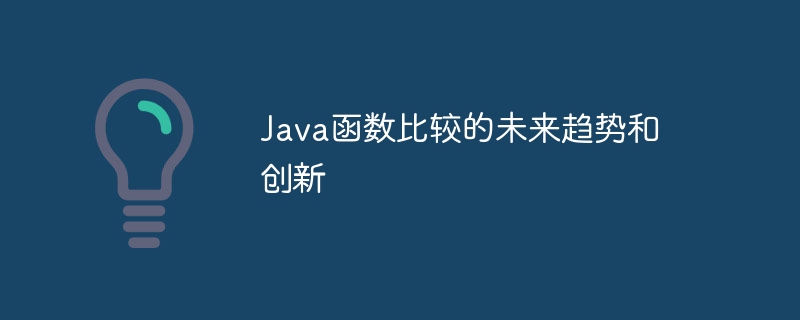Future trends and innovations in Java function comparison
Future trends in Java function comparison include: 1. Pattern matching for type checking; 2. Functional programming for improving flexibility; 3. Stream operations for processing collections. Practical examples demonstrate how these trends can be used to optimize the sorting process of large string lists, significantly improving efficiency.

Future trends and innovations in Java function comparison
Function comparison in the Java language is a basic concept, and new trends and innovations are constantly introduced to improve its efficiency and flexibility. This article explores future trends and innovations in Java function comparison and provides a practical case to demonstrate the application of these advances.
Trend 1: Pattern Matching
Pattern matching is a powerful mechanism that allows expressions to be compared using patterns. Java 17 introduced Pattern Matching for instanceof, which enables easier and more concise type checking by the instanceof operator. For example:
if (object instanceof String s) {
// s 可以作为 String 类型使用
}Trend 2: Functional Programming
The functional programming paradigm emphasizes the use of immutable data and pure functions. Java 8 introduced functional interfaces and lambda expressions to make function comparison more flexible and dynamic. For example:
Comparator<String> comparator = (s1, s2) -> s1.length() - s2.length();
Trend 3: Stream operation
A stream is a set of elements that can be processed sequentially. Java 8 introduced the Streams API, making it easier to transform and filter collections or sequences of functional comparison operations. For example:
List<String> sortedList = list.stream()
.sorted(Comparator.comparing(String::length))
.collect(Collectors.toList());Practical case: Sorting a large string list
Consider a list containing a large number of strings. Using a traditional for loop for comparison would be inefficient. We can leverage trends and innovations in Java function comparison to optimize this process:
import java.util.List;
import java.util.stream.Collectors;
class StringComparator {
public static void main(String[] args) {
// 生成包含大量字符串的列表
List<String> strings = generateStrings(1_000_000);
// 使用函数式编程和流操作进行排序
long startTime = System.currentTimeMillis();
List<String> sortedStrings = strings.stream()
.sorted(Comparator.comparing(String::length))
.collect(Collectors.toList());
long endTime = System.currentTimeMillis();
// 打印排序结果并显示运行时间
System.out.println("Sorted strings: " + sortedStrings);
System.out.println("Runtime: " + (endTime - startTime) + " ms");
}
private static List<String> generateStrings(int count) {
List<String> strings = new ArrayList<>();
for (int i = 0; i < count; i++) {
strings.add(generateRandomString(100));
}
return strings;
}
private static String generateRandomString(int length) {
return UUID.randomUUID().toString().substring(0, length);
}
}The above is the detailed content of Future trends and innovations in Java function comparison. For more information, please follow other related articles on the PHP Chinese website!

Hot AI Tools

Undresser.AI Undress
AI-powered app for creating realistic nude photos

AI Clothes Remover
Online AI tool for removing clothes from photos.

Undress AI Tool
Undress images for free

Clothoff.io
AI clothes remover

AI Hentai Generator
Generate AI Hentai for free.

Hot Article

Hot Tools

Notepad++7.3.1
Easy-to-use and free code editor

SublimeText3 Chinese version
Chinese version, very easy to use

Zend Studio 13.0.1
Powerful PHP integrated development environment

Dreamweaver CS6
Visual web development tools

SublimeText3 Mac version
God-level code editing software (SublimeText3)

Hot Topics
 Square Root in Java
Aug 30, 2024 pm 04:26 PM
Square Root in Java
Aug 30, 2024 pm 04:26 PM
Guide to Square Root in Java. Here we discuss how Square Root works in Java with example and its code implementation respectively.
 Perfect Number in Java
Aug 30, 2024 pm 04:28 PM
Perfect Number in Java
Aug 30, 2024 pm 04:28 PM
Guide to Perfect Number in Java. Here we discuss the Definition, How to check Perfect number in Java?, examples with code implementation.
 Random Number Generator in Java
Aug 30, 2024 pm 04:27 PM
Random Number Generator in Java
Aug 30, 2024 pm 04:27 PM
Guide to Random Number Generator in Java. Here we discuss Functions in Java with examples and two different Generators with ther examples.
 Weka in Java
Aug 30, 2024 pm 04:28 PM
Weka in Java
Aug 30, 2024 pm 04:28 PM
Guide to Weka in Java. Here we discuss the Introduction, how to use weka java, the type of platform, and advantages with examples.
 Armstrong Number in Java
Aug 30, 2024 pm 04:26 PM
Armstrong Number in Java
Aug 30, 2024 pm 04:26 PM
Guide to the Armstrong Number in Java. Here we discuss an introduction to Armstrong's number in java along with some of the code.
 Smith Number in Java
Aug 30, 2024 pm 04:28 PM
Smith Number in Java
Aug 30, 2024 pm 04:28 PM
Guide to Smith Number in Java. Here we discuss the Definition, How to check smith number in Java? example with code implementation.
 Java Spring Interview Questions
Aug 30, 2024 pm 04:29 PM
Java Spring Interview Questions
Aug 30, 2024 pm 04:29 PM
In this article, we have kept the most asked Java Spring Interview Questions with their detailed answers. So that you can crack the interview.
 Break or return from Java 8 stream forEach?
Feb 07, 2025 pm 12:09 PM
Break or return from Java 8 stream forEach?
Feb 07, 2025 pm 12:09 PM
Java 8 introduces the Stream API, providing a powerful and expressive way to process data collections. However, a common question when using Stream is: How to break or return from a forEach operation? Traditional loops allow for early interruption or return, but Stream's forEach method does not directly support this method. This article will explain the reasons and explore alternative methods for implementing premature termination in Stream processing systems. Further reading: Java Stream API improvements Understand Stream forEach The forEach method is a terminal operation that performs one operation on each element in the Stream. Its design intention is






